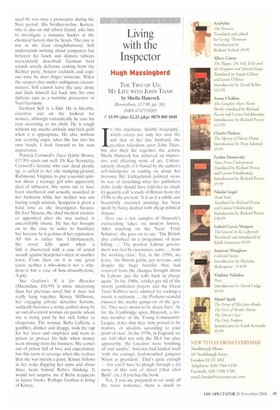Living with the Inspector
Hugh Massingberd
THE Two OF US: MY LIFE WITH JOHN THAW by Sheila Hancock
Blooinshuly, f17.99, pp. 301, ISBN 0747570205
.15.99 (plus /2.25 p&p) 0870 800 4848 In this ingenious 'double biography', which covers not only her own life and that of her late husband, the peerless television actor John Thaw, but also their life together, the actress Sheila Hancock has achieved an impressive and affecting work of art. Unfortunately, though, it is flawed by the author's self-indulgence in ranting on about her tiresome Bel Littlejohnish political views by way of furnishing what her publishers (who really should have told her to chuck it) quaintly call 'a study of Britain from the 1930s to the present'. It is as if a subtle and beautifully executed painting has been spoilt by being daubed with cheap political slogans.
Here are a few samples of Hancock's excruciating 'takes' on modern history. After touching on the Nazis' Final Solution', she goes on to say, 'The British also embarked on a programme of mass killing ... The postwar Labour government was 'led by visionaries, some ... from the working class'. Yet, in the 1950s, we learn, 'the British public got nervous, and despite the huge benefits they had received from the changes brought about by Labour, put the toffs back in charge again.' In the 1960s, 'cricket got rid of the snooty gentlemen players and the Great Train Robbers were admired for cocking a snook at authority ... the Profumo scandal exposed the murky goings-on of the gently. They were shown to be sleazy liars.' As for the Cambridge spies, Hancock, a former member or the Young Communists' League. notes that they 'now proved to be traitors, or idealists according to your point of view'. In the 1970s, in England, we are told that not only the IRA but also, apparently, 'the Loyalists' were 'bombing all and sundry'. America had landed itself 'with the corrupt, foul-mouthed gangster Nixon as president'. That's quite enough — but you'll have to plough through a lot more of this sort of drivel (that idiot Bush', etc.) if you buy the book.
Yet, if you are prepared to set aside all the naive nonsense, there is much to
admire and enjoy in this skilfully puttogether chronicle, which is interwoven with a diary Hancock kept of the time before and after Thaw's death in February 2002. Sheila Ilancock, nine years her second husband's senior, was born in 1933, the daughter of a publican called Enrico Hancock (possibly a godson of Caruso), who subsequently worked at the Vickers factory in Crayford. After getting laughs as Dopey in Snow White at junior school, and a spell as a 'vaccie' (evacuee) in the country, our Sheil won a scholarship to both Dartford Grammar School and Rada. In rep at Bath she met her first husband, the actor Alec Ross, a charming, feckless figure upon whom Terence Rattigan is said to have based the character of Freddie Page in The Deep Blue Sea. Like Thaw he was a drinker and also died of cancer of the oesophagus.
John Thaw was the elder son of a longdistance lorry driver based in a tough area of Manchester whose wife abandoned her two boys when John was seven and his younger brother five. One day John arrived at junior school clutching a dirty handkerchief to a had cut on his hand. When questioned by the teachers, he explained that he had done it opening a can of beans for his and his brother's breakfast. He earned his pocket money by doing impersonations in talent concerts and, inspired by his masters at Ducie Technical College, won a place at Rada.
Hancock is very good at defining Thaw's genius. He was simply a born actor: 'As a child he had learned to cope on his own and, as an actor, he could develop his characters on his own.' He was naturally observant and had a photographic memory. 'The thing was,' Hancock wrote in her diary, 'you couldn't see the wheels turning so they couldn't tell how skilled he was.' She describes a scene in the final Morse, when the camera tracks into Morse's face as he sits alone in his flat:
He is confronted with retirement and loneliness. John does nothing. No movement of the eyes or puff of a cigarette. He just is. It is as powerful a piece of work as he ever did in his career. An example of screen acting at its finest.
As for tears, Hancock explains they were always Thaw's last resort,
in acting or in life, as the struggle to suppress them is more moving than paroxysms of grief. Indeed the audience cry for him.
Reading Hancock's raw account of their sometimes turbulent marriage, their illnesses and, in particular, her haunting quest for what happened to Thaw's absent mother is certainly an emotional experience. Yet in the tradition of the sit-corns in which Hancock made her name, there is occasional light relief. I particularly liked Nicol Williamson's crack to Trevor Nunn, who was dithering about the most effective way to kill one of the Macduff children in Macbeth: 'Why don't they take him into the wings and you can bore him to death?'
In her diary Sheila Hancock notes that the first time she laughed after John Thaw's death was when her four-year-old grand-daughter told her at the check-out at Marks & Spencer, 'Now look. Grandad's dead, he won't come back, but you're very old so you'll be dead soon too.'



























































































 Previous page
Previous page